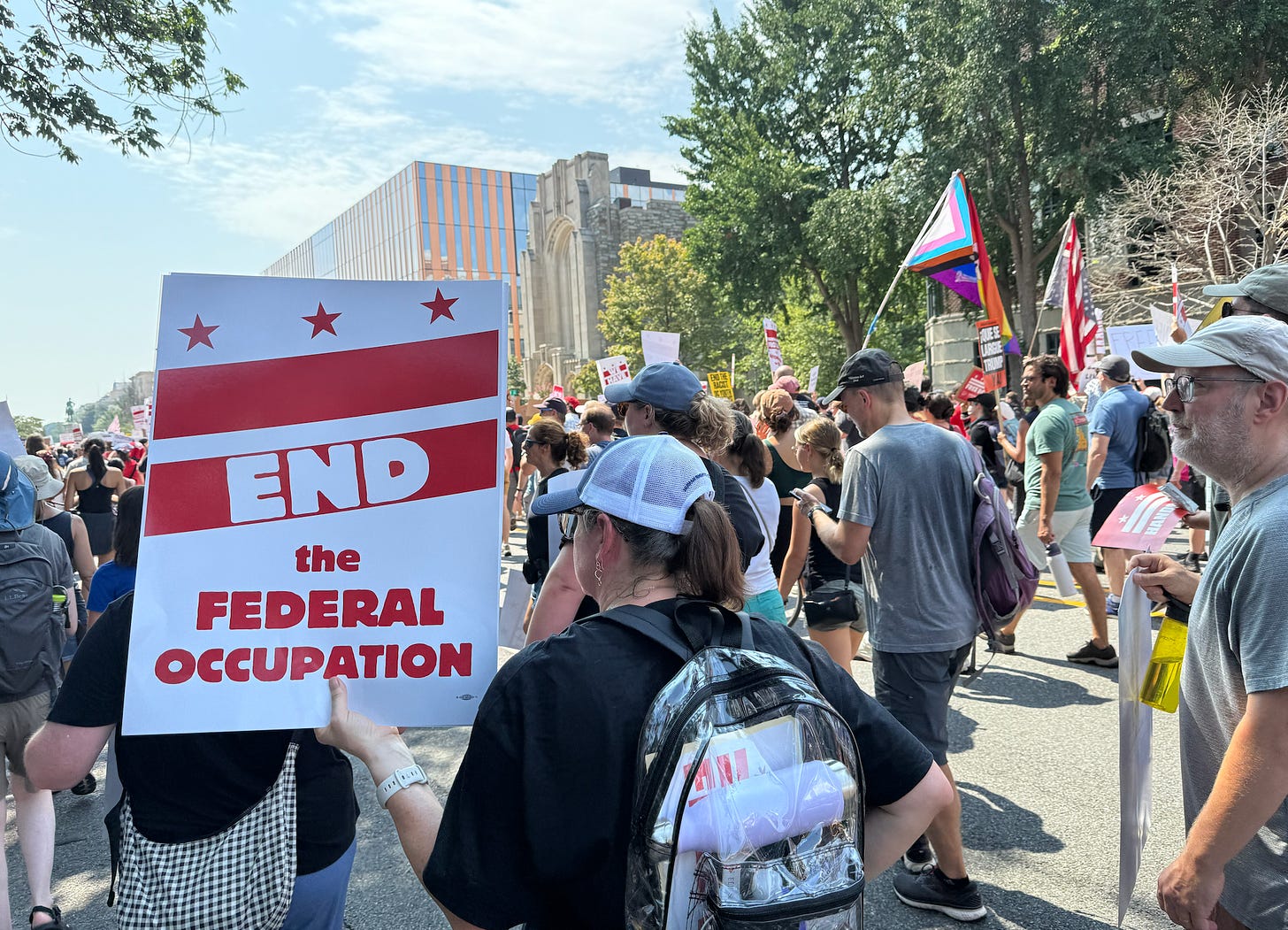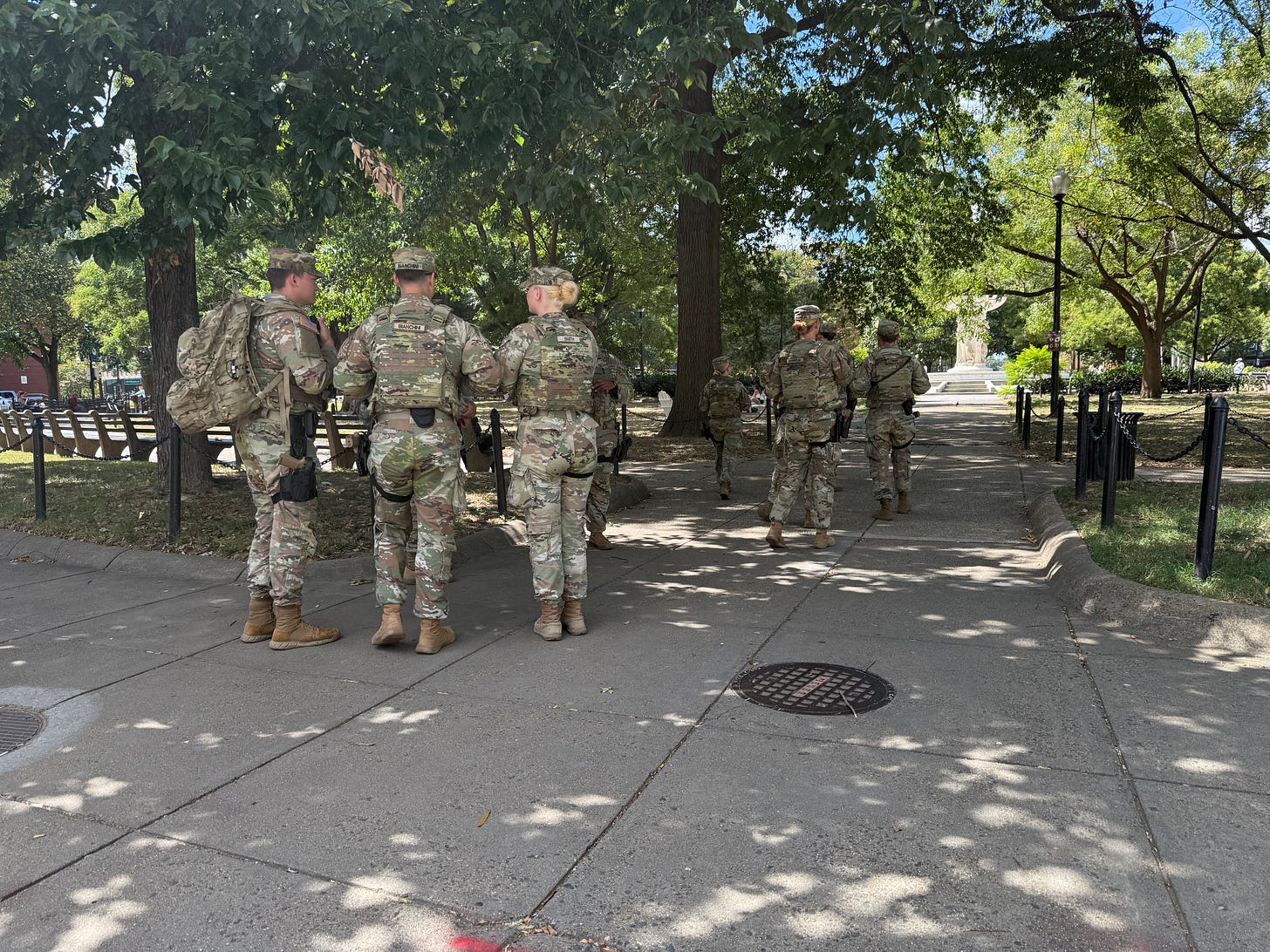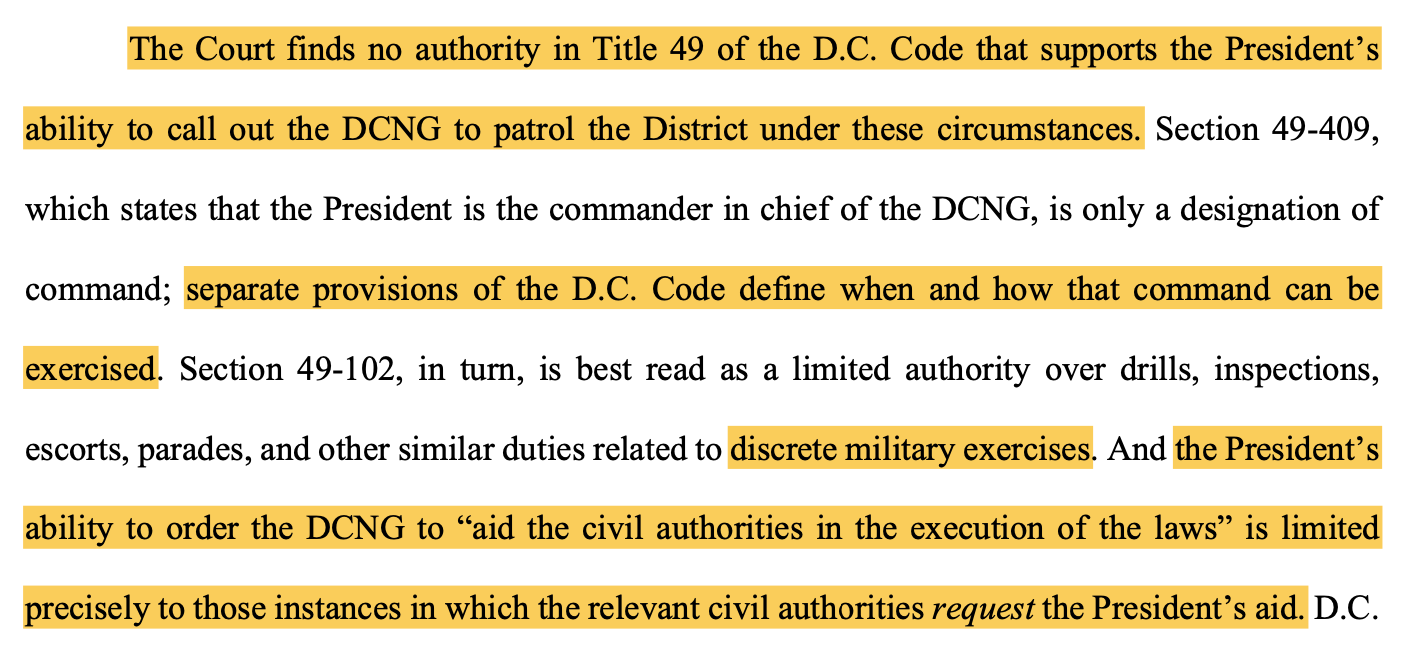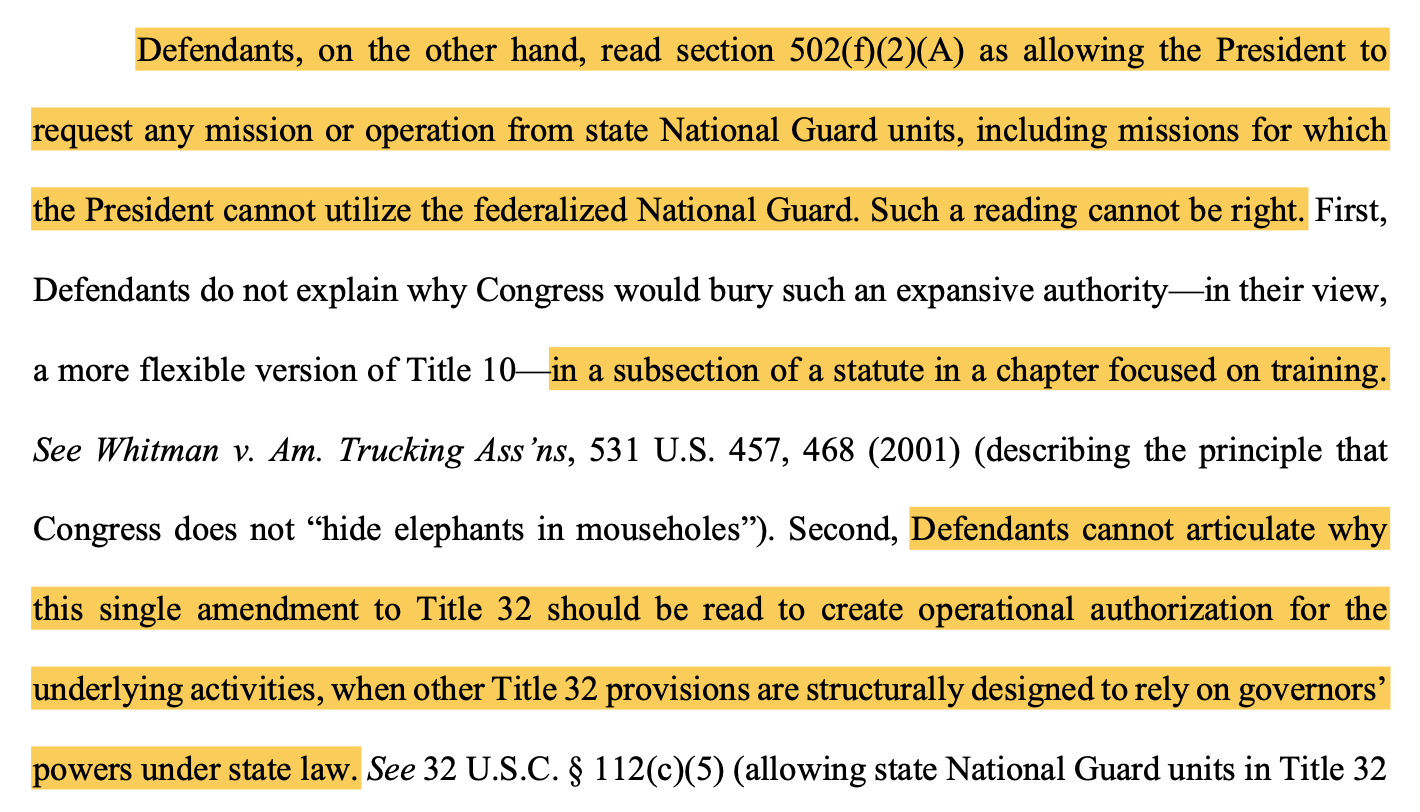Federal judge rules Trump's D.C. troop invasion is likely illegal, must end by Dec. 11
National Guard troops have been in D.C. since August. A federal judge ruled Thursday that both deployments — D.C. National Guard and out-of-state troops — likely violate the law.
U.S. District Judge Jia Cobb ruled on Thursday that the Trump administration likely acted illegally in deploying members of the D.C. National Guard across Washington, D.C. since August and in working with several states to deploy their National Guard troops to D.C.
Cobb, a Biden appointee who held a hearing in October over D.C. Attorney General Brian Schwalb’s lawsuit on behalf of D.C., granted the District’s preliminary injunction request in an order that is stayed for 21 days “to permit orderly proceedings on appeal.”
If not blocked by a higher court, then, troop deployment would end in D.C. on December 11 — four months after President Donald Trump authorized it.
The ruling continues the unbroken trend of trial court judges finding that the National Guard deployments set in motion by Trump over the past six months are likely illegal, unconstitutional, or both. The rulings including four federal judges — in California, Oregon, Illinois, and now D.C. — and one state court judge in Tennessee.
Although the U.S. Court of Appeals for the Ninth Circuit had allowed the deployment in Los Angeles to continue during appeals, the U.S. Court of Appeals for the Seventh Circuit denied the Justice Department’s request for a stay of a similar order in Illinois — which led to a still-pending stay request at the U.S. Supreme Court. Appeals in the Oregon case, where deployment has been blocked, are now on hold pending the outcome of that Supreme Court request.
The D.C. case, however, is different insofar as the Trump administration is using different authorities to justify the deployments in D.C. than was used in California, Oregon, and Illinois. (The Tennessee case issues are based on state law, as different issues are involved in the intrastate deployment.)
As such, D.C.’s approach to bringing the case needed to be different — and, as a result, Schwalb was likely more cautious — and Cobb’s approach to hearing the case was less rushed because there was no temporary restraining order request, just the preliminary injunction request that she ruled on Thursday.
At the end of her consideration of those arguments, D.C.’s arguments, and some history, Cobb found that “the District is likely to succeed on the merits of its statutory arguments against Defendants’ deployments of both the [D.C. National Guard] and the out-of-state National Guards.“
First, Cobb had to establish that D.C. had standing to bring its challenge. Among other arguments, the Justice Department “questioned whether” D.C. could argue that the deployment caused an injury to its sovereignty because it is not a state but a “statutory creation.” Cobb wasn’t buying that argument, concluding, “The District may not be a sovereign like a state is, but it can nevertheless exercise delegated sovereign powers and is therefore injured by being unlawfully deprived of those powers.“ Additionally, she found that the out-of-state troops cause “a distinct injury … to [D.C.’s] constitutional status as a federal district free from state interference.”
Taking a step back before diving into the actual deployment questions, Cobb noted:
[T]he Court observes that the scope of the infringement here is no small matter. The deployments at issue entail the day-to-day presence of more than 2,000 National Guard troops, about two-thirds the size of the MPD, on the streets of the District. … And there is also the risk that this incursion may become permanent, or at least enduring, given the creation of a DCNG unit specifically established to conduct law enforcement in the District.
She then turned to the two types of deployments, addressing the likelihood of D.C.’s success in its arguments — generally the most important factor of a preliminary injunction request.
This is where the case begins looking significantly different from the earlier cases.
As to the D.C. National Guard, D.C. is different because Trump is similar to the governor of a state in that he is the commander-in-chief of the D.C. National Guard.
Here, we are not dealing with the Title 10 status addressed in California, Oregon, and Illinois involving the “federalization” of the National Guard, but rather Title 32 status, where the National Guard is acting in a “hybrid” federal-state status. In this case, specifically, this is made more complicated by D.C.’s status. Trump is both the president, who set in motion these actions, and the commander-in-chief of the D.C. National Guard.
Nonetheless, because of the fact that this action was not “federalization” of the D.C. National Guard, it is state law — here, D.C. law — that applies. On that front, Cobb rejected DOJ’s arguments that Title 49 of the D.C. Code authorized this deployment or that Trump, as commander-in-chief of the D.C. National Guard, has the authority to deploy it as he wishes.
“The Court finds no authority in Title 49 of the D.C. Code that supports the President’s ability to call out the DCNG to patrol the District under these circumstances.”
Additionally, Cobb noted a brief suggestion of an argument that Trump could his Article II executive powers under the U.S. Constitution regardless of what D.C.’s laws say.
To that, Cobb concluded, “The Court rejects Defendants’ fly-by assertion of constitutional power, finding that such a broad reading of the President’s Article II authority would erase Congress’s role in governing the District and its National Guard.“
There are also the out-of-state troops deployed to D.C.
“Over 1,000 out-of-state National Guard members are also deployed in the District in reliance on the President’s authority under 32 U.S.C. § 502(f),” Cobb wrote, regarding the provision of Title 32 addressing, “Required drills and field exercises.“ Yes, that is the provision DOJ argued allowed multiple states to send troops into D.C. for several months.
As Cobb explained, under the provision, “a member of the National Guard may ‘be ordered to perform training or other duty’ in ‘[s]upport of operations or missions undertaken by the member’s unit at the request of the President or Secretary of Defense.’“
The Trump administration argued that means any operation or mission that Trump requests their use for, so long as the governor sending the National Guard troops agrees.
“Within the context and structure of Title 32, the Court finds that section 502(f) cannot bear the expansive interpretation that Defendants attribute to it and that Plaintiff is also likely to succeed on the merits of this claim,” Cobb wrote. Instead, she wrote, “The Court concludes that section 502(f)(2)(A) is best understood to encompass operations or missions requested by the President that are authorized under state law.“
This is so, she wrote, for several reasons. In a footnote, she noted two key concerns with DOJ’s interpretation: It “would allow the President to avoid the strictures of the Posse Comitatus Act,” and “permitting such missions would risk trampling on the sovereignty of the receiving states, who are not required to consent to the section 502(f) missions under [DOJ’s] interpretation.”
What’s more, she explained how this argument runs counter to the entire purpose of the Emergency Management Assistance Compact, which “requires the consent of both the sending and receiving states” when seeking out-of-state National Guard support. DOJ’s 502(f) interpretation, she wrote, “would allow the President to ignore the receiving states’ voices entirely.“
Summing it up, Cobb wrote of DOJ’s broad interpretation, “Such a reading cannot be right.“
Finally, in a particularly compelling section, Cobb discussed how the Title 10 limits — under Section 12406 — that have been the focus in the federal cases over the state deployments interacts with the limits discussed in her opinion.
The president’s “expansive Title 10 authority … is limited by equally strong restraints,“ she wrote, noting the Seventh Circuit’s stay decision in the Illinois case. “Additionally, the federalized National Guard is considered part of the federal armed forces and subject to the Posse Comitatus Act’s prohibition on the use of armed forces in domestic law enforcement.“
Contrast that with state governors, who she wrote “are not generally authorized to act outside of their own state’s borders or to respond to crises outside of their jurisdictions.” But, she continued, “Congress and the states have developed the EMAC as a mechanism that permits states to send their National Guards to assist other states in times of crisis.”
“As currently designed, Title 10, the EMAC, and the PCA function as interlocking pieces of a comprehensive scheme, placing limits on the use of the National Guard under both its federal and state statuses,“ she wrote. “Congress has not eviscerated those limits“ in an amendment to the “drills and field exercises” provision, Cobb concluded.
Expect DOJ to file an appeal to and stay request at the U.S. Court of Appeals for the D.C. Circuit in short order, with a request to the Supreme Court if the D.C. Circuit denies them a stay pending appeal.







Sad it took so long, but VERY glad up see the decision.
Expect tirades in ALL CAPS and a stamping of the foot—Baby Huey on a tear of vituperation and grievance.